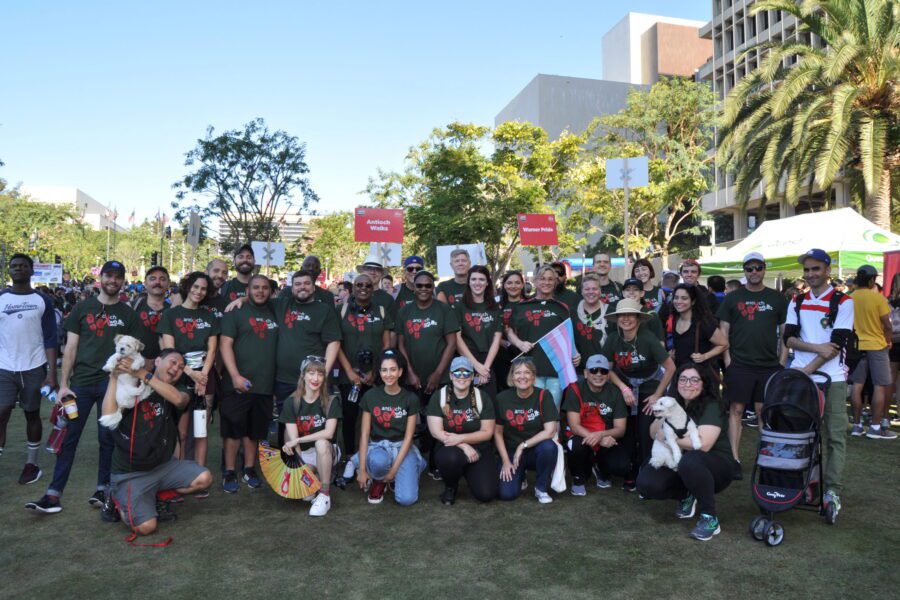 During his successful career as a food industry executive, from a small family-run business to a Fortune 50 company, Lynn Olsen always knew that he wanted to pass on the knowledge that he had acquired, as a teacher. For Olsen, who graduated from Antioch’s Leadership and Change program in 2010 and finished his dissertation while serving as vice president of retail operations for Supervalu—a grocery chain with more than 1,300 stores and 900 pharmacies across the United States—that meant helping people learn how to solve problems within organizations. It’s what Olsen calls “Edge Leadership,” a style which involves a mindful approach to leading substantial change, to turn a failing organization into a successful one that can be sustained and grown over time, while at the same time supporting individual contributors in their career journeys.
During his successful career as a food industry executive, from a small family-run business to a Fortune 50 company, Lynn Olsen always knew that he wanted to pass on the knowledge that he had acquired, as a teacher. For Olsen, who graduated from Antioch’s Leadership and Change program in 2010 and finished his dissertation while serving as vice president of retail operations for Supervalu—a grocery chain with more than 1,300 stores and 900 pharmacies across the United States—that meant helping people learn how to solve problems within organizations. It’s what Olsen calls “Edge Leadership,” a style which involves a mindful approach to leading substantial change, to turn a failing organization into a successful one that can be sustained and grown over time, while at the same time supporting individual contributors in their career journeys.
It was this focus that was the subject of Olsen’s dissertation research at Antioch University. To develop a methodology to bring a company back to health, he investigated Red Wing Shoes. The 100-year-old Minnesota shoe manufacturing and retailing business had struggled under family ownership and management. At the time of his research, the family had brought in professionally-trained leadership in an attempt to turn profits around. Olsen interviewed Red Wing’s president and senior leadership team and cataloged 25 actions that were considered the most significant to the firm’s well-being. The results of this research became part of his “Edge Leadership” concept, which is now a key focus of his consulting work—which includes, among other engagements, serving on the board of a precision glass and ceramics components manufacturer and a software and professional services firm.
Aside from his research and nearly 40 years of work experience, Olsen has the agility required of any great leader. He left college in his late teens to focus on building a career and supporting his family. Over 20 years later, he returned to school at age 42 to finish his undergraduate degree in management, followed by his MBA and then, five years later, his PhD at Antioch—with most of his studying done in tandem with serving as a full-time executive. Olsen also began teaching as an adjunct business professor in 1999 after finishing his MBA, with classes held during nights and weekends. When he retired as vice president of retail operations for Supervalu in 2010, he started his own consulting company, where he now works primarily with retail, technology, health care, manufacturing, and professional services firms. As one example, he recently finished a more than two-year-long assignment with Northgate markets in Southern California, a 40-store, family-owned, Hispanic supermarket company, traveling there every other week from Minneapolis to help the company develop and execute a retail operations and service effectiveness strategy.
To say that Olsen is busy and always has been, is an understatement, as he told Antioch management professor Peter Vaill in 2005 when Vaill suggested that Olsen pursue his PhD. But because of the unique low-residency design approach that Antioch offered, Olsen knew that he could find a way to fit his studies into his schedule and continue his education journey. What really intrigued him about the program, said Olsen, were the twin elements of research methodology and leadership studies, combined with its foundational emphasis on social justice.
“It’s about always treating people well and being conscious about how your leadership affects other people,” he said.
In his career, Olsen has seen that knowing the strategies for success is just as important as having the right attitude to lead. He said that growing up as the second oldest of eight children, where his parents separated when he was 11-years-old, instilled in him values of responsibility, humility, and a moral compass that points to treating people ethically.
“In my career, I‘ve found a large number of people who don’t treat people well, and as they climb the ladder they tend to look down on others,” said Olsen. “Even as a senior executive, I always tried to mentor and develop others, and I’ve had people on my team who followed me from one part of the company to another so that we could continue doing good work together.”
Olsen said servant leadership is the key, and Antioch University teaches it well.




